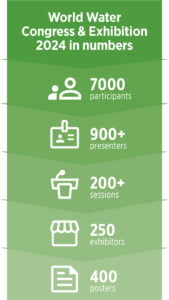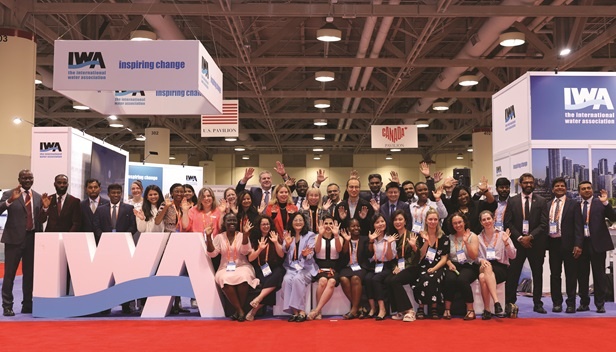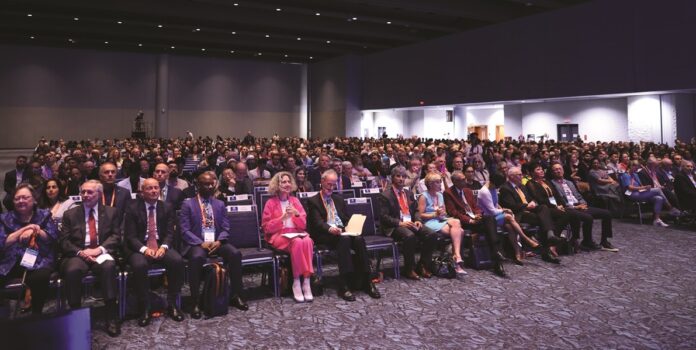The 2024 IWA World Water Congress & Exhibition landed in Toronto, Canada, on 11-15 August and delivered the latest great success in the event series.
 Drawn by a comprehensive programme and a global exhibition, the latest edition of IWA’s biennial flagship event brought together participants to present and access the latest insights on the world’s most pressing water-related issues, networking and making connections, and building partnerships to further change. Held in Toronto, Canada, on 11-15 August, the IWA World Water Congress & Exhibition 2024 was an outstanding event, hosting 7000 participants from around the world.
Drawn by a comprehensive programme and a global exhibition, the latest edition of IWA’s biennial flagship event brought together participants to present and access the latest insights on the world’s most pressing water-related issues, networking and making connections, and building partnerships to further change. Held in Toronto, Canada, on 11-15 August, the IWA World Water Congress & Exhibition 2024 was an outstanding event, hosting 7000 participants from around the world.
Under the banner of ‘Shaping our water future’ and featuring more than 900 presentations and 200 sessions, the event was of particular relevance to the climate change agenda and the UN Sustainable Development Goals (SDGs) – especially the need and opportunities for progress with sanitation. But including and beyond these two critical themes, the programme was notable for its richness and diversity, drawn from IWA’s membership and its strong network of respected water professionals. With content proposals hugely oversubscribed, the programme committee had a wealth of excellent content from which to select, and this was evident from the quality and breadth of the presentations and workshops.
Staged with the great support of CWWA, CAWQ and Destination Toronto, the Congress gathered water experts, thought-leaders, decision-makers, leading researchers, and business representatives from within and outside the water sector. It featured five dedicated forums: the Utility Leaders Forum; the International Water Regulators Forum; the Emerging Water Leaders Forum; and forums on groundwater, and industry and water.
Discussions were focused on six main – hugely topical – thematic tracks: water utility management; wastewater and resource recovery; drinking water and potable reuse; city-scale planning and operations; communities, communication and partnership; and water resources and large-scale water management.
Plenary keynotes and panel discussions
Alongside all of this, plenary sessions with keynote speakers and panel discussions brought to the fore key water challenges and thinking on how to respond to them, with one particular highlight being the keynote speech given at the Opening Ceremony by leading scientist, innovator and communicator Dr Peter Gleick.
The co-founder of the Pacific Institute in Oakland, California, based his keynote on his latest book, The Three Ages of Water: Prehistoric Past, Imperiled Present, and a Hope for the Future, in which he sets current concerns around water in context, but looks also to examples providing options for the future. His message to delegates was that we have the skills for success – an empowering message that set the tone for Congress at this critical time for action.
“Dr Gleick’s message to delegates was that we have the skills for success – an empowering message that set the tone for Congress at this critical time for action”
The impressive keynote speaker line-up through the week included Paul Brown, President, Paul Redvers Brown Inc., who focused on resilience in planning and project management. Ong Tze-Ch’in, Chief Executive, PUB, Singapore’s national water agency, spoke on the utility’s digital future under the title of ‘A Smart and AI-enabled PUB’. Professor Amy Pruden, Virginia Tech, USA, explored health concerns and connections with water under the topic of ‘The water sector and the slow pandemic of antimicrobial resistance’. Batsirai Majuru, Technical Officer, Water, Sanitation, Hygiene and Health Unit at the World Health Organization, highlighted the important role of regulation in securing basic needs with ‘Taps and toilets in the time of change: A new era for water and sanitation regulation’.
Saroj Kumar Jha, Global Director, Water Global Practice, World Bank Group, explored the increasingly important area of financing water solutions for climate resilience. In the same plenary session, Henk Ovink, Executive Director, Commissioner, Global Commission on the Economics of Water, USA, and the Netherlands’ first water envoy, gave a keynote on the economics of water, with particular focus on the impacts of climate change on the young and the most vulnerable. Farokh Kakar, Environmental Engineer, Brown and Caldwell Consultants, set out thoughts on youth, technology and water. Lastly, Professor Juliet Willetts, Institute for Sustainable Futures, University of Technology Sydney, Australia, brought several of the week’s themes together in her talk on ‘Path-shifting to address global challenges: Transformative adaptation in practice’.
The keynotes were complemented by some outstanding panel discussions. Convened by IWA, these featured participation of the leadership of key industry organisations from around the world, such as the Water Services Association of Australia, AWWA, ESAWAS, WEF, DANVA, Australian Water Association, and ABES.

Forward-looking utility agenda at its core
This participation reflected the wider prominence of utilities, regulation, and water and sanitation service provision as a core focus of the Congress.
This was particularly evident through the latest Utility Leaders Forum and the 9th International Water Regulators Forum. The former was organised over two days and proved again to be an excellent focus for utility participation in the Congress, attracting more than 250 utility professionals and bringing together prominent water utility leaders with impactful experiences to share. Sessions at the Utility Leaders Forum covered water security and resilience, and breakthroughs on climate adaptation, as well as utility work on the circular economy.
Utility activity was also at the heart of the opportunity the Congress gave to recognise practical attention to climate change. Under the IWA Climate Smart Utilities Initiative, the 2024 edition of the Recognition Programme, supported by Xylem, identified and recognised water and sanitation utilities for their efforts in tackling climate change with breakthrough technologies to address challenges such as water scarcity, climate adaptation and the circular economy. This year’s recognition was presented in two categories: the Achiever (utilities that have already made substantial progress in their climate smart journey) and Entrant (utilities that have prioritised the climate agenda and have started their climate smart journey).
Accessing industry expertise
One of the special aspects of Congress is the opportunity to meet other water sector professionals face to face and access up-to-date expertise. This includes connecting with sponsors who, this year, featured Grundfos and Xylem as Principal Sponsors, and the City of Toronto as Platinum Sponsor, as well as Jacobs, Ramboll, Black & Veatch, Noventa, Enwave, Comcore, Stantec and CSD Water Service. The exhibition show floor hosted 250 exhibitors from around the world. This saw staging of an Operations Challenge and featured an extensive Business Forum programme, all providing the perfect environment to catch up with existing contacts, forge new relationships, and find out about the latest state-of-the-art technologies from world-leading solutions providers, equipped to transform urban water management and, with that, our cities of the future.

Recognition of excellence
The Opening Ceremony had set the tone for the week, not least in terms of Toronto being a platform for excellence. Three prestigious awards were revealed in the Opening Ceremony: Professor Joan Rose was announced as the recipient of the Global Water Award; Sabrina Rashid Sheonty won IWA’s Young Leadership Award; and Professor Juliet Willetts won the Gender Diversity and Water Award.
The highest of IWA’s global accolades, the Global Water Award, recognises exceptional individuals who, through innovative leadership and practice, have made an outstanding contribution to progress towards a world in which water is wisely managed.
The 2024 winner, Professor Joan Rose, is a hugely respected member of the global water community and global leader on wastewater surveillance, the Homer Nowlin Chair in Water Research at Michigan State University, USA, and Co-Director of the university’s Center for Advancing Microbial Risk Assessment (CAMRA).
Her work on water reuse, pathogen removal, and climate and waterborne diseases, which focuses on the application of new molecular methods, surveillance of pathogens, removal of pathogens by water and wastewater treatment, and quantitative microbial risk assessment has contributed to international understanding of the impact of water quality on health. Her career has addressed the pressing problems of crypto-sporidium and protozoa, with her research producing leading, globally respected, academic papers on the subject.
This recognition of excellence ran from start to end, with the Closing Ceremony including the announcement of the six outstanding poster presentations from the 400 displayed, the recipients being: Embrey Bronstad, USA; Yujie Chen, Tohoku University, Japan; Xiaonan Tang, The George Washington University, USA; Polly Grundy, Cranfield University, UK; Faruque Mia, Regional Municipality of York, Canada; and David Renfrew, Imperial College London, UK.
Mobilising participation
Looking to the future of the water sector, participation of Young Water Professionals (YWPs) stood out prominently at the Congress. The first cohort of IWA LeaP, IWA’s leadership programme aimed at empowering young water professionals, was announced. This initiative focuses on equipping the next generation of leaders with the skills and knowledge needed to tackle pressing global challenges, such as climate change and water scarcity. Furthermore, the continuation of the IWA and Grundfos Youth Action for SDG 6 Fellowship Programme was confirmed. This was all in addition to staging the latest Emerging Water Leaders Forum.
Practical progress on water also depends on successful implementation of projects and the Congress again provided the opportunity to celebrate examples of success from around the world at the IWA Project Innovation Awards Gala.
An end with new beginnings
In keeping with tradition, the Congress Closing Ceremony saw the handing over of the IWA ‘talking stick’ to the next host of the event, also with the outgoing IWA President giving the stage to the new one. The latter saw Tom Mollenkopf AO handing the Presidential baton to Professor Hamanth Kasan. An IWA Distinguished Fellow, Professor Kasan’s extensive experience in the sector spans 34 years, marked by leadership roles across academia, utilities and international development agencies, and as an Honorary Professor at the Institute of Water and Wastewater Research he has advanced world-class training and research in African water services.
Attention now turns to the 2026 edition of the World Water Congress & Exhibition, which will take place in Glasgow, Scotland. Already excited to receive the next edition of this prestigious Congress, our 2026 hosts helped close the Toronto event with a stirring bagpipe performance, giving us a flavour of what we can look forward to when we convene again in two years’ time. •
More information








